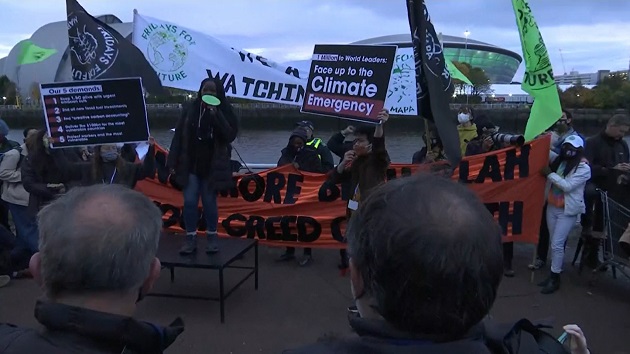Corporations struggle on climate goals amid backlash over 'woke capitalism,' experts say


Corporate America took notice four years ago when Larry Fink, CEO of investment giant BlackRock, declared climate change a top concern. “Climate risk is investment risk,” Fink wrote in an annual letter popular in C-suites.
His latest letter, released last month, spans well over 100 paragraphs before the first mention of “climate.” Whereas Fink mentioned “climate” a total of 29 times in the 2020 letter, he wrote it just four times in the missive last month.
The shift in Fink’s letters has coincided with an apparent wider chill of momentum behind climate action among many of the world’s largest companies, which have faced a conservative backlash against sustainable business practices derided as “woke capitalism,” experts told ABC News.
Many firms have struggled to follow through on ambitious, years-old climate pledges, in part due to high interest rates that make funding more expensive, the experts added, noting that some environmentally conscious companies have bucked the trend.
“BlackRock is still considering climate risk but boy has their message changed,” Mindy Lubber, chief executive of environmental advocacy group Ceres, which examines corporate conduct, told ABC News.
“The pushback has been fierce and severe, and we’re seeing things slow down,” Lubber added.
BlackRock did not respond to ABC News’ request for comment.
In a statement on its website, BlackRock says a worldwide transition to net-zero carbon emissions by 2050 would “benefit the global economy and our clients in aggregate.” In turn, BlackRock encourages clients to develop “robust transition plans” by 2030, the statement adds, noting the limitations of BlackRock’s role as an asset manager.
“BlackRock’s role in the transition is as a fiduciary to our clients,” the statement says. “Our role is to help them navigate investment risks and opportunities, not to engineer a specific decarbonization outcome in the real economy.”
A little over half of the world’s largest 2,000 companies have adopted pledges to achieve net-zero carbon emissions, according to data from research firm Net Zero Tracker reviewed by ABC News. Net zero marks the point at which a given firm offsets its emissions by removing the same amount of carbon from the atmosphere.
The number of companies with net-zero pledges has jumped 40% over the past 16 months, the data showed. However, the vast majority of the company pledges lack credibility, Net Zero said, noting that only one out of every 20 commitments meets United Nations guidelines for what constitutes a quality pledge.
To meet the U.N. threshold for a quality pledge, a company must adopt a plan to address all forms of carbon emissions, present intermediate goals for emissions cuts by 2030 and align its government lobbying with the objective of net zero, among other criteria.
“There is unequivocally a massive lack in the quality of these plans,” John Lang, the project lead at Net Zero Tracker, told ABC News. “We just haven’t seen momentum or movement on that.”
“It’s easy to set a target,” Lang said. “It’s much harder to create a robust plan to meet that target.”
Dave White, director of the Global Institute of Sustainability and Innovation at Arizona State University, said the evidence of major companies fulfilling climate pledges is “mixed at best.”
“We’ve seen important progress but many of these companies are realizing they’re meeting only a small fraction of the aspirational goals they’ve made,” White said.
Experts who spoke with ABC News attributed the corporate difficulties to a surge of conservative criticism over sustainable business practices as well as high interest rates, which make it more costly for companies to pursue capital-intensive climate initiatives.
Conservatives have directed much of their ire at environmental, social and governance investing, or ESG, a type of investing that takes into account non-financial information about a company, such as its climate impact and staff diversity.
Prominent Republican politicians, such as Florida Gov. Ron DeSantis, have assailed ESG as a portfolio strategy that prioritizes liberal goals over investor returns. Eighteen states have adopted anti-ESG legislation — and all but one features a Republican governor, law firm K&L Gates found in July.
“When it comes to things like these Wall Street banks, what they’re doing to try to impose an agenda is something that’s very, very troubling,” DeSantis said last May upon signing a law that prohibits state officials from investing state money to further ESG goals.
Some on the left have questioned the rigor of ESG funds, warning that they establish insufficient standards for companies seeking to qualify.
ESG investing, meanwhile, has sharply declined. Funds worldwide categorized as “responsible investing” received $68 billion of net new deposits in 2023 through November, according to data from financial firm LSEG Lipper. That amount had fallen dramatically from $158 billion for all of 2022 and $558 billion for all of 2021.
The backlash from conservatives, White said, has hampered corporate conduct beyond ESG, including carbon emissions commitments.
“The politicization of this area in some cases is providing cover for corporations to backslide on their commitments,” White said.
To be sure, some companies have continued to achieve progress toward achieving net-zero emissions, some experts said, noting that the recent hiccup in climate action owes more to the scale of the task than the reluctance of the corporations.
“The transition to a carbon neutral economy that we’re experiencing is really a transition on the scale of the great industrial revolution,” George Georgiev, a professor at Emory University School of Law, told ABC News.
“I don’t think it’s a retrenchment — it’s more of a professionalization of the function within companies and them being more careful,” he added. “We’re probably not moving fast enough but that doesn’t mean we can’t adjust course.”
Copyright © 2024, ABC Audio. All rights reserved.






